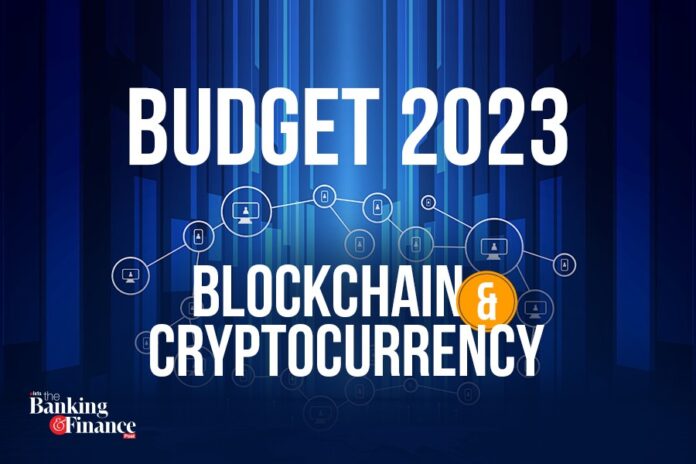Union Budget 2023: What the Crypto and Blockchain Industry Predicts

The sector hopes that the government will allow crypto investors to recoup and carry forward their losses to level the playing field for virtual digital assets (VDAs) in India.
After the introduction of a 30 percent crypto tax in the last budget, crypto trading volume in India fell by up to 90 percent. The sector has made a number of demands from the federal budget in this circumstance.

The cryptocurrency industry hopes that FM Sitharaman will propose a proper regulatory framework for domestic cryptocurrency exchanges. More clarification on the impending Crypto Bill, as well as some respite from crypto taxation, are also on the wish list (which currently stands at 30 percent).
Right now, the crypto tax front is unmistakably difficult for new investors and traders entering this ecosystem. There’s a lot to worry about, from obscure tax quirks to increased TDS on crypto transactions. As a result, crypto fans have attached specific expectations to the Union Budget 2023.
As the budget approaches, the first agenda item that appears to be delayed is the regulation of cryptocurrency market. Bitcoin and other digital currencies have been around for more than a decade. Despite this, the government is still unsure whether to regulate the market or not. 2023 seems to be the year when a decision should be made on this front.
 Pratik Gauri, Co-Founder and CEO, 5irestated “Of course the decline in trade volumes by as much as 85-90% is worrying and the fear of not attracting investment in the innovative Web3 startups will affect the overall picture. But, as I have said before, taxation of income and wealth is entirely the government’s area of responsibility, and they have the exclusive right to impose and collect such fees.
Pratik Gauri, Co-Founder and CEO, 5irestated “Of course the decline in trade volumes by as much as 85-90% is worrying and the fear of not attracting investment in the innovative Web3 startups will affect the overall picture. But, as I have said before, taxation of income and wealth is entirely the government’s area of responsibility, and they have the exclusive right to impose and collect such fees.
What I feel is of utmost importance here is to remember that any monumental shift caused by Web3 will be the world shifting from a “value capture” economy to a “value creation” economy. This will require a new set of rules, which democratize access to resources for creators and make value creation as rewarding as capturing value. This means a direct relationship between human capital and the consumers of its creation.
It is important to ensure that any tax regime does not hinder the development of India’s talent in Web3 and the supercharged innovative environment India has experienced recently.
The effort to introduce the new CBDC shows that the RBI and the tax regime are committed to innovation. We look forward to working with them to produce dApp, DeFi and ReFi solutions that help.”
 Ankit Wadhwa, Co-Founder and CEO, Rario stated, “While 2022 has been a transformative year for the digital collectibles industry, with the growing popularity of digital trading cards and virtual digital assets with proof of ownership using blockchain technology, the industry size will rise to approximately USD 426 billion in 2022 worldwide. We also believe that blockchain technology will help India rise significantly in ranking among the nations to be the undisputed world leader in this field.We hope that the G20 presidency is also used to drive innovation in blockchain technology with India at the forefront.
Ankit Wadhwa, Co-Founder and CEO, Rario stated, “While 2022 has been a transformative year for the digital collectibles industry, with the growing popularity of digital trading cards and virtual digital assets with proof of ownership using blockchain technology, the industry size will rise to approximately USD 426 billion in 2022 worldwide. We also believe that blockchain technology will help India rise significantly in ranking among the nations to be the undisputed world leader in this field.We hope that the G20 presidency is also used to drive innovation in blockchain technology with India at the forefront.
We welcomed the carve-outs made by the Ministry of Finance in June 2022 in the definition of virtual digital assets (VDA) introduced in the last budget in February 2022, excluding (a) tokens whose transfer results in the transfer of ownership of the underlying tangible asset; (b) gift cards or coupons; (c) mileage points, reward points or loyalty cards, which are a record given without direct money; and (d) subscription to websites or platforms or applications. We also hope for a further revision in the definition of VDA in the upcoming Finance Act that separates crypto-based tokens from non-crypto-based tokens and separate tax regimes for each. Our digital player cards are on a custom Rario blockchain, where we do not rely on cryptocurrency whatsoever, and they can only be purchased through fiat currency.”
 Preekshit Gupta, Vice President – APAC & MEA, Bureausays “The Indian identity verification and fraud prevention industry is on the cusp of exponential growth and we hope that the upcoming budget will be a catalyst for this growth. Regulatory and policy reforms such as the passage of the Data Protection Act and the creation of a robust and effective Data Protection Authority will ensure a conducive environment for the sector to thrive in. We also expect the budget to provide financial incentives to boost innovation and encourage entrepreneurs to adopt risk orchestration solutions to tackle issues such as fraud prevention, data security, KYC compliance and identity theft.
Preekshit Gupta, Vice President – APAC & MEA, Bureausays “The Indian identity verification and fraud prevention industry is on the cusp of exponential growth and we hope that the upcoming budget will be a catalyst for this growth. Regulatory and policy reforms such as the passage of the Data Protection Act and the creation of a robust and effective Data Protection Authority will ensure a conducive environment for the sector to thrive in. We also expect the budget to provide financial incentives to boost innovation and encourage entrepreneurs to adopt risk orchestration solutions to tackle issues such as fraud prevention, data security, KYC compliance and identity theft.
Over the past few years, an increase in mobile internet penetration and innovation in the payments landscape has accelerated our pace towards a digital economy. However, these digital advances have also created unprecedented opportunities for criminals to commit fraud. India is expected to have 900 million internet users by 2025 and there is an urgent need to secure our online presence, especially from fraudsters. We therefore hope that the government will provide additional funding, incentives and tax exemptions to incentivize companies to build a robust data security infrastructure that will fuel the government’s “Digital India” vision.
Furthermore, there is a need to focus on initiatives that will help build recognition of the need for robust identity verification systems and also drive consumer awareness to educate society at large. This will go a long way to ensuring that everyone has access to secure digital identities, thus enabling a secure digital economy. This is also in line with the government’s vision to make India a $5T economy in the coming years. All these measures will not only help the industry but will also benefit the Indian economy as a whole. With Budget 2023, the cybersecurity industry can finally get the lift it needs to keep pace with the ever-evolving digital landscape.”
 Rahul Pagidipati, CEO, ZebPaystated, “2022 has been a defining year for Web3 and the crypto industry. Despite being a relatively new and untested market, the crypto industry has witnessed rapid growth in India with an increasing number of people showing interest in investing in the asset class .According to a report published by FICCI and EY in 2022, Web 3.0 and blockchain could add a staggering $1.1 trillion to India’s GDP by 2032.
Rahul Pagidipati, CEO, ZebPaystated, “2022 has been a defining year for Web3 and the crypto industry. Despite being a relatively new and untested market, the crypto industry has witnessed rapid growth in India with an increasing number of people showing interest in investing in the asset class .According to a report published by FICCI and EY in 2022, Web 3.0 and blockchain could add a staggering $1.1 trillion to India’s GDP by 2032.
In FY22, the government announced a 30% plus surcharge and cess as well as 1% TDS deduction on transfer of virtual digital assets. While it is great to see the government taking a step towards regulating VDAs, in the upcoming Budget 2023 we urge the government to create a progressive regulatory framework and offer clarity on taxation by reducing TDS and capital gains taxes and aligning them with other asset classes such as stocks and bonds. This will address the ongoing concerns and uncertainty surrounding the industry by creating transparency and helping industry players protect users from any kind of black swan event like the FTX collapse. Clear governance and regulations will enable more people to invest in VDAs and achieve financial freedom. It will also encourage innovation to transform existing businesses through blockchain technology, as well as build newer solutions for the industry to thrive.”

Elet’s The Banking and Finance Post Magazine has carved a niche for itself in the crowded market with exclusive and unique content. Gain in-depth insights into trend-setting innovations and transformation in the BFSI sector. Best offer for Print + Digital editions! Subscribe here➔ www.eletsonline.com/subscription/
Get a chance to meet Who’s Who in NBFCs and Insurance Industry. Join us for upcoming events and explore business opportunities. Like us on Facebook, contact us on LinkedIn and follow us further TwitterInstagram and Pinterest.


